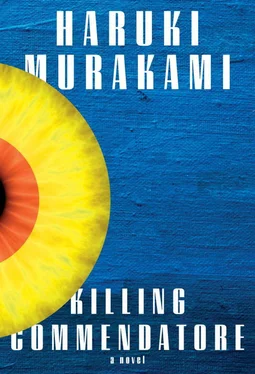“Exactly. A consensus arising out of necessity.”
“Not having a set framework was both a strength and a weakness of Japanese painting. Could we interpret it this way?”
“I think so.”
“But when we look at a painting, in most cases we have the sense whether it’s a Japanese painting or not. Right?”
“That’s right. There’s an intrinsic method used. A kind of trend, or tone. And a tacit, shared understanding. It’s hard sometimes to define it, though.”
Menshiki was silent for a while. “If a painting is non-Western, then does it have the form of a Japanese painting?”
“Not necessarily,” I replied. “In principle there are Western paintings that have a non-Western form.”
“I see,” he said. He tilted his head ever so slightly. “But if it’s a Japanese painting, then to some extent it will have a non-Western form about it. Would that be accurate?”
I gave it some thought. “Put that way, yes, you could say so. I hadn’t thought about it that way, to tell you the truth.”
“It’s self-evident, but still difficult to put into words.”
I nodded in agreement.
He paused for a moment, and then went on. “If you think about it, it’s akin to defining yourself as compared with another person. The difference is self-evident, but still difficult to verbalize. As you said, you can perhaps only understand it as a kind of tangent produced when external and internal pressure combine to create it.”
Menshiki gave a slight smile. “Fascinating,” he added in a small voice, as if to himself.
What are we talking about? I suddenly thought. An intriguing topic in its own right, but what significance did this conversation hold for him? Was it mere intellectual curiosity? Or was he testing my intellect? What was the point?
“By the way, I’m left-handed,” Menshiki said at one point, as if he’d just recalled this fact. “I don’t know if that will be helpful, but it’s another piece of information about me. If I’m told to go left or right, I always choose left. It’s become a habit.”
—
It was finally near three o’clock, and we set the date and time of our next session. He would come to my house in three days, on Monday at one p.m. As he did this day, we would spend two hours together in my studio, and I would attempt to sketch him again.
“I’m in no rush,” Menshiki said. “As I said in the beginning, take as much time as you need. I have all the time in the world.”
And then he left. Through the window I watched him get into his Jaguar and drive away. I picked up all the sketches I’d done of him, studied them for a time, then tossed them aside.
A terrible silence descended over the house. Now alone, it was as if the silence had become all the more weighty. I went out on the terrace and there was no wind, the air jelly-thick and chilly. It felt like it was going to rain.
I sat down on the living room sofa, reviewing the conversation Menshiki and I had had, in order. How we’d talked about posing for a portrait. About Strauss’s opera Der Rosenkavalier . About how Menshiki had started a tech company, sold off his stock, and with the sizable profit retired young. How he lived all alone in that huge house. His first name was Wataru. Written with the character that means “to cross a river.” He’d always been a bachelor, and his hair had turned white early on. He was left-handed and was now fifty-four. How Tomohiko Amada had made a bold pivot, how one should grab opportunity by the tail and never let go. The definition of Japanese painting. And finally, about the relationship between Self and Other.
What in the world did he want from me?
And why wasn’t I able to do any decent sketches of him?
The answer was simple, really. Because I had not yet grasped what lay at the core of his being.
After talking with him I felt uneasy. Yet at the same time, my curiosity about him had grown all the stronger.
Thirty minutes later heavy drops of rain began to fall. The little birds had by then already vanished.
10
AS WE PUSH OUR WAY THROUGH THE LUSH GREEN GRASS
When I was fifteen my younger sister died. It happened very suddenly. She was twelve then, in her first year of junior high. She had been born with a congenital heart problem, but since the time she was in the upper grades of elementary school she hadn’t shown any more symptoms, and our family had felt reassured, holding out the faint hope that her life would go on, without incident. But in May of that year her heartbeat became more irregular. It was especially bad when she lay down, and she suffered many sleepless nights. She underwent tests at the university hospital, but no matter how detailed the tests the doctors couldn’t pinpoint any changes in her physical condition. The basic issue was supposed to have been resolved back when she’d had her operations, and the doctors were baffled.
“Avoid strenuous exercise, and follow a regular routine, and things should settle down soon,” the doctor said. That was probably all he could say. And he wrote out a few prescriptions for her.
But her arrhythmia didn’t settle down. As I sat across from her at the dining table I often looked at her chest and imagined the defective heart inside it. Her breasts were beginning to noticeably develop. Her heart might have problems, but her flesh continued growing nonetheless. It felt strange to see my little sister’s breasts grow by the day. Up till then she’d just been a little child, but now she’d suddenly had her first period, and her breasts were slowly starting to take shape. Yet within that tiny chest, my sister’s heart was defective. And even a specialist couldn’t pinpoint the defect. That fact alone had my brain in constant turmoil. I spent my adolescence in a state of anxiety, fearful that, at any moment, I might lose my little sister.
My parents told me to watch over her, since her body was so delicate. While we attended the same elementary school I always kept my eye on her. If need be, I was willing to risk my life to protect her and her tiny heart. Though the opportunity never presented itself.
She was on her way home from junior high one day when she collapsed and lost consciousness while climbing the stairs at Seibu Shinjuku Station. She was rushed by ambulance to the nearest emergency room. By the time I got home and then raced to the hospital, her heart had already stopped. It all happened in the blink of an eye. That morning we’d eaten breakfast together, said goodbye to each other at the front door, me going off to high school, she to junior high. And the next time I saw her she’d stopped breathing. Her large eyes were closed forever, her mouth slightly open as if she were about to say something. Her developing breasts would never grow.
The next time I saw her she was in a coffin. She was dressed in her favorite black velvet dress, with a touch of makeup, her hair neatly combed. She had on black patent-leather shoes and lay faceup in the modestly sized coffin. The dress had a white lace collar, so white it looked unnatural.
Lying there, she appeared to be peacefully sleeping. Shake her lightly and she’d wake up, it seemed. But that was an illusion. Shake her all you want, but she would never awaken again.
I didn’t want my sister’s delicate little body to be stuffed into that cramped, confining box. Her body should be laid to rest on a much more spacious place. In the middle of a meadow, for instance. We would wordlessly go to visit her, pushing aside the lush green grass as we went. The wind would slowly rustle the grass, and birds and insects would call out from all around her. The raw smell of wildflowers would fill the air, pollen swirling. When night fell, the sky above her would be dotted with countless silvery stars. In the morning a new sun would make the dew on the blades of grass sparkle like jewels. But in reality she was packed away in some ridiculous coffin. The only decorations were ominous white flowers that had been snipped by scissors and stuck in vases. The narrow room had fluorescent lighting that was drained of color. From a small speaker set into the ceiling came the artificial strains of organ music.
Читать дальше











